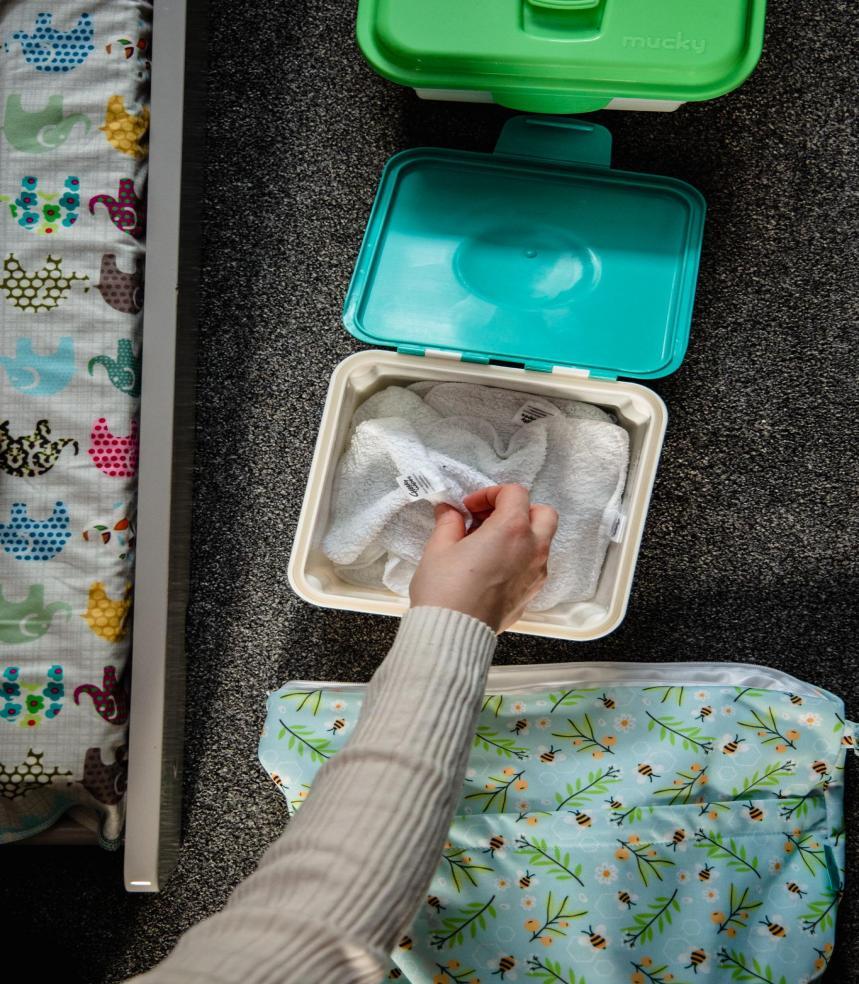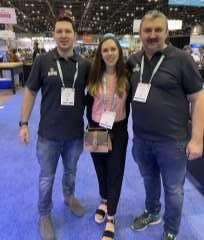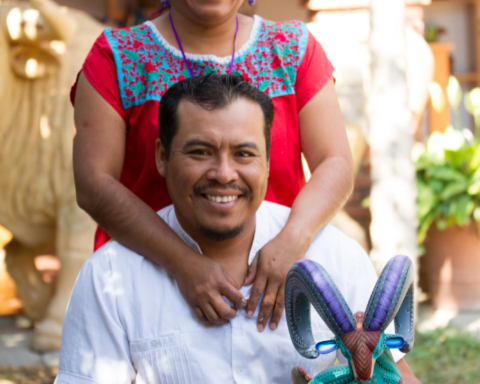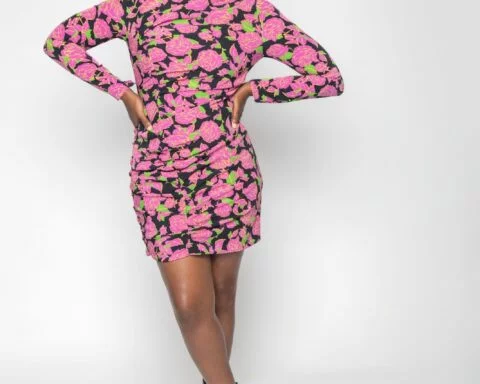
Helen Rankin is the founder of Cheeky Wipes. She has led the way in Simple Reusable alternatives to single-use products in the UK since 2008. Launched at the height of the last recession, the company has grown to a turnover of £4m in 2020.
‘Necessity is the mother of invention,’ says Rankin. ‘I’ve suffered from eczema since I was a child and never quite grew out of it like medical professionals said I would. When my eldest son was born, I was in the middle of an eczema flare-up on my hands, which were cracked and bleeding. I couldn’t use disposable baby wipes as they irritated my skin, so I looked for an alternative.
Initially, I cut up an old towel and soaked it in a Tupperware container, but within weeks, they looked like rags, something you would wash the car with. The Tupperware container was great in the house but bulky to carry around. Over a while, though, I tweaked and developed my system.
I discovered that water, lavender & chamomile oil smelled great; I would soak the wipes when and this mix kept them smelling fresh for a few days. I also found that wet bags were the best solution for carrying clean and dirty wipes when out and about and that a mesh laundry bag made washing the mucky wipes much easier as you didn’t need to touch them to wash them.
Rankin continued ‘However it wasn’t until 3 years later when my second son was born, that I considered making a business out of my idea. He spent a few days in hospital when he was a couple of months old, and I had to use disposable wipes, and I was reminded again of how horrid they were to use.
You could never pull just one out of the packet; they came out in clumps and still irritated my skin. They were expensive considering how much they would cost if you used them for every nappy change every day for the 2 and a half years your child was likely to be in nappies. Moreover, that was without considering the environmental cost of landfill from producing and throwing away all these plastic-filled wipes!
I thought that if I could manufacture reusable wipes, it would be easy for other people to switch to reusables, and I could make a business selling my kit concept. Not just to people like me who used reusable nappies, but also to the other parents who were the majority of the population who would have considered cloth nappies but who chose not to for whatever reason.
With 2 children and a third on the way, going back to work full-time was going to be difficult, but I still needed to contribute to the household and do something for myself that didn’t revolve around being a Mum or wife. So, in October 2008, when I was 37 weeks pregnant with baby number 3, I launched Cheeky Wipes.

What challenges were faced in launching Cheeky Wipes?
‘Well, I had a marketing background, which was helpful, but I knew NOTHING about manufacturing, and it’s fair to say that these were my biggest hurdles. To get started, I worked with a middleman who helped me refine my idea and found me a manufacturing partner in China for some kit elements.
At one time, one batch of ‘pop-top’ boxes had latches prone to rusting, meaning that we had to supply replacement latches for any customers impacted in this way. We also had one batch of wipes that hadn’t been overlocked completely, and each of the 100,000 wipes had to be overlocked again here in the UK.
These crises were all part of a learning curve for me. I had my ‘What would Sir Alan Sugar do’ moments. For those in the US, Sir Alan Sugar is the UK equivalent of Donald Trump on ‘The Apprentice. This technique gave me objectivity and the headspace to step back from the problem and find a solution. And there’s always a solution that also teaches you resilience!
The key is to learn from your mistakes and not give up. Fix them and do whatever it takes to leave your customer happy.
The pinch point for me came when around 3 years after setting up the business, I once again had to borrow money to pay a £10k import duty fee on a container of goods. I realized that the business wasn’t making enough profit to be sustainable and that something needed to change.
I decided to cut out the middleman and start sourcing goods myself. Slowly, I started researching possible suppliers. This was tricky because I had to be sure that my suppliers would pay their employees a fair wage and ethically treat them. One by one, I found great suppliers and visited their factories for myself to ensure that our standards were maintained.’
‘But manufacturing wasn’t the only challenge we faced,’ Rankin said. ‘Back in 2008, consumers just weren’t environmentally aware. David Attenboroughs ‘Blue Planet’ was 10 years away from being made, highlighting the impact of plastics on our oceans and waterways. When we talked to expectant parents at exhibitions about the possibility of reusing wet wipes, they were often shocked and horrified by the thought. ’You put poop in your washing machine?!’
We stuck with it, though, and gradually grew the business because the product spoke for itself over time. It worked brilliantly to cleanse the baby’s skin gently. It saved parents hundreds of pounds over time their baby needed wiping and was very eco-friendly. But most importantly, it was EASY to use. New parents want the convenience of an all-in-one system that works at home, out, and about. They’ve got enough to think about when they bring a new baby home from the hospital; they need wipes to be super convenient and simple.
We continued to grow the business by developing more products along the same ‘Simple Reusables’ line – solving solutions to our problems. Having had children, internal period products weren’t suitable for me, so we looked for an alternative.

Our range of period pads and Cheeky period pants grew from this and have been hugely successful with our customer base, which led us to create our daughter brand Cheeky Pants which focuses purely on pants, pads, and other products for periods and incontinence. We were delighted to have this hard work recognized by the award of the Queen’s Award for Enterprise in Sustainable development in 2021, the most prestigious business award in the UK.’
What Challenges Are Businesses Facing Right Now, Particularly In The Green Economy?
‘It’s a tough time for business right now,’ Rankin said. ‘All businesses in the UK and EU have been impacted in some way by Covid, although this had less of an impact on us. Brexit has been a poorly thought out, politically motivated c**k up, which has cost many businesses dearly with little to no upside.
These have impacted our business by severely increasing our costs. A container costs USD 4000 to ship to almost $19000. Price rises like this aren’t sustainable to absorb, and like many other businesses, we’ve had to pass these costs on to consumers reluctantly.
Alongside huge increases in energy prices, these spiraling living costs are hitting consumers in the pocket, and it certainly feels like a recession is looming. Consumers are watching their spending, and for many eco-businesses, that can be a challenge as often the sustainable alternatives are initially more costly than the perceived lower-cost disposable alternative’.
What Opportunities Are Businesses Facing Right Now?
Rankin answered thoughtfully, ‘For us, we launched in the middle of the 2008 recession, so we’re ready to strap in and hold on for the ride. We’re lucky that our best-selling reusable wipes kit has saved consumers more than £500 over two years. However, that comes with an upfront cost. We’re viewing this challenge of the spiraling cost of living as an opportunity to push the market beyond the primarily eco-conscious ‘green’ consumer and into the mass market.
And Finally, What Advice Do You Have For Others About Business?
Rankin paused for a moment. ‘A few pieces of advice for anyone in business. Firstly, find something you’re passionate about and believe in, surround yourself with great people who also believe, and then JFDI (Just flipping do it).
It makes it SO much easier when times get tough if you have people around you who will roll with it and jump in to come up with a solution that works, rather than roll over and give up. I’m so lucky, the people surrounding me are fantastic, and I’ve known them a long time. I couldn’t do this without their support, passion, and belief.
Once you’ve got that idea and good people around you, plan and then take the risk and go for it. I’d much rather regret something I did than something I didn’t.
Be objective and ignore trolls. As I said earlier when problems arise, it’s really helpful to step back and have your ‘what would Jesus / Sir Alan / Elon Musk do’ moment. I’ve found it’s much easier to think rationally and problem solve without the gnawing anxiety that issues arising can cause. Online trolls seem to have nothing better to do with their lives than putting other people and businesses down. Don’t engage; if you don’t feed them, they’ll eventually disappear. They want nothing more than to wind other people up, so don’t give them the satisfaction. They’ll soon get bored and move on.
The Customer is King. Don’t get me wrong, the customer can also sometimes be a mahoosive PITA but for us having spectacular customer service is the glue that holds the company together. From customer feedback informing our design processes and helping to improve our products with each production run. Through our customer advice questionnaires, customers complete a few simple questions online and receive a tailored advice recommendation from one of our small team of customer services experts.
And they are experts! They all use our products, LOVE to overshare, and can chat about pee, poop, and periods all day. They take great pride in our fantastic reviews on Trustpilot, and they joke that they like it if something goes wrong with an order because it gives them a chance to connect with the customer.
If you think about leaving a review if you order goods online and they arrive in good time and are happy with them, that’s what you expect, so it’s rare to leave a review. However, if something goes wrong, you’ve got the opportunity to turn a disgruntled, heavily pregnant Mama into a Cheeky advocate for life who will tell their friends all about your products and fantastic service. That rocks and completes the customer feedback cycle!’
- FDC – Giejo Magazine Article - July 29, 2023
- MoriMa Tea the – Chinese tea culture - April 26, 2023
- Missionary Position – Least Likely To Bring You To Climax - April 7, 2023






